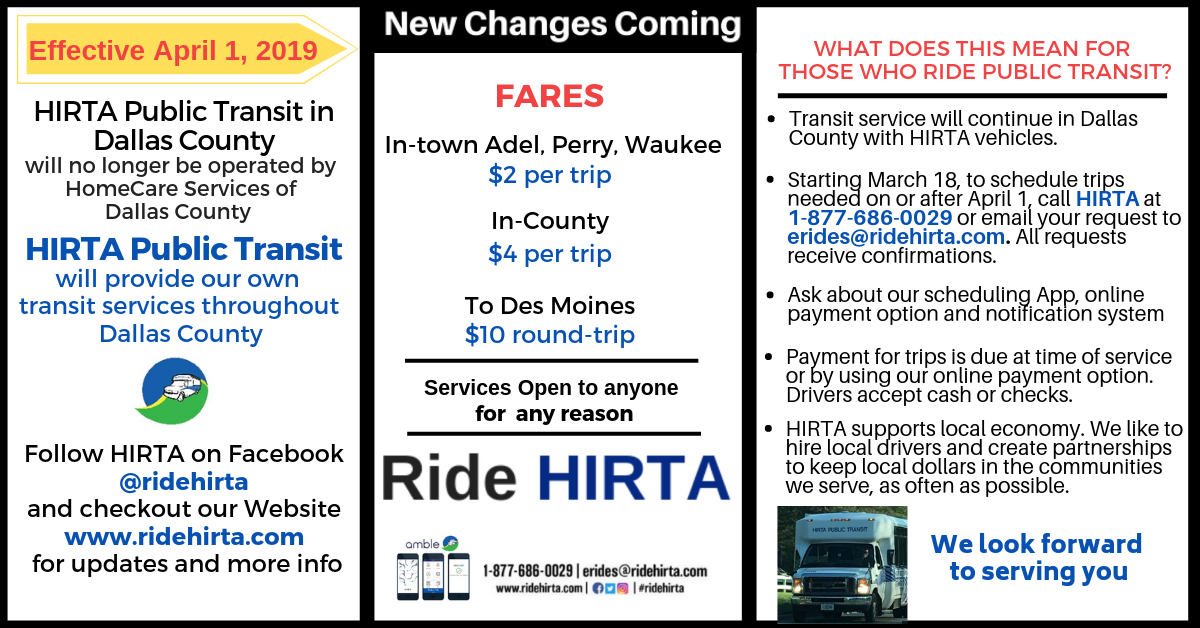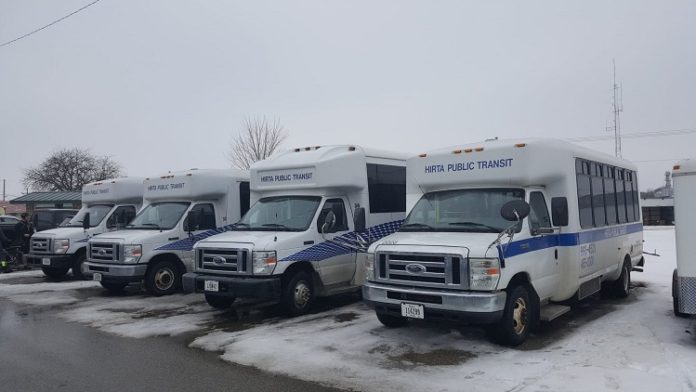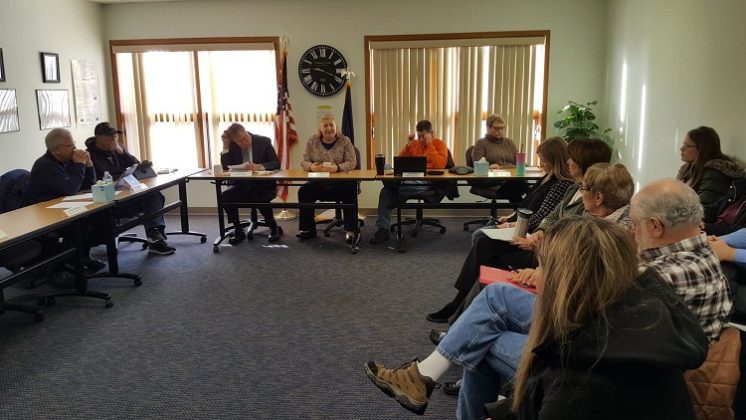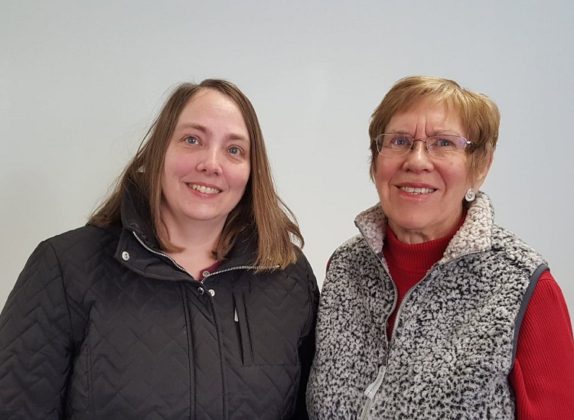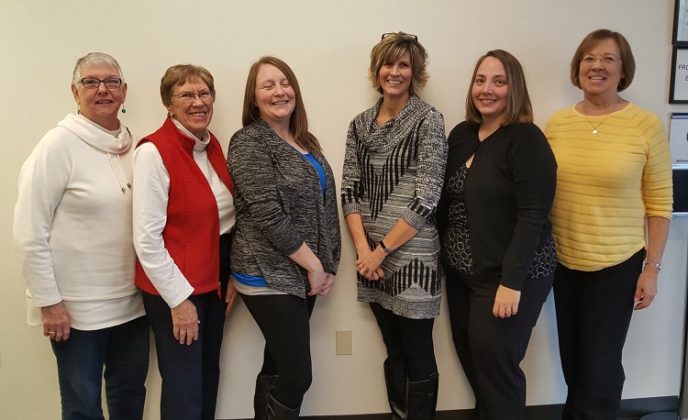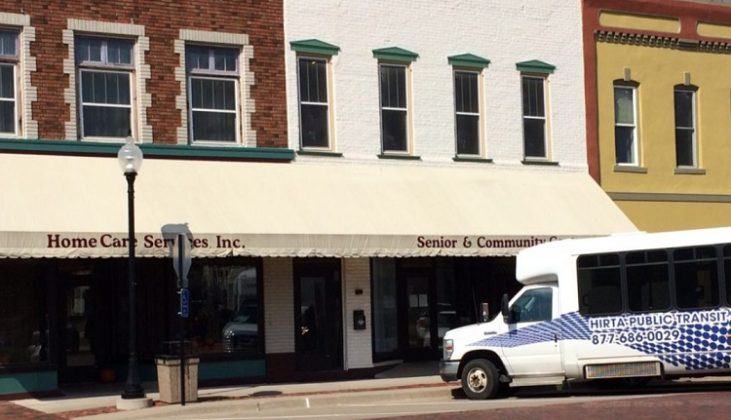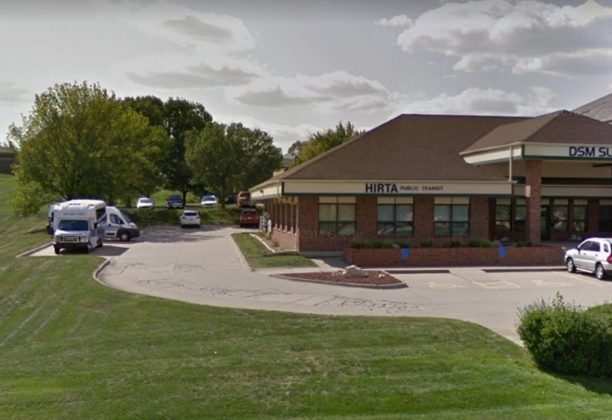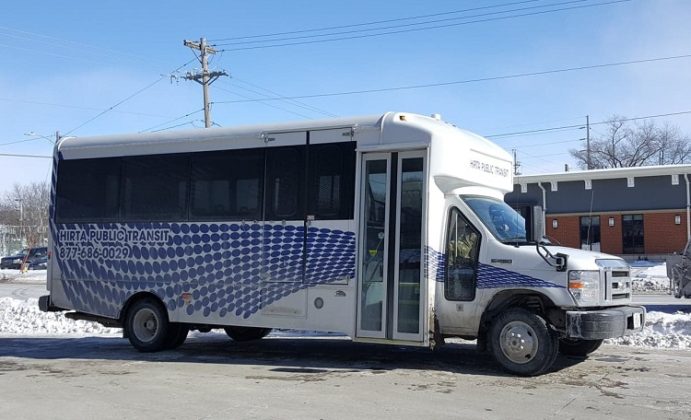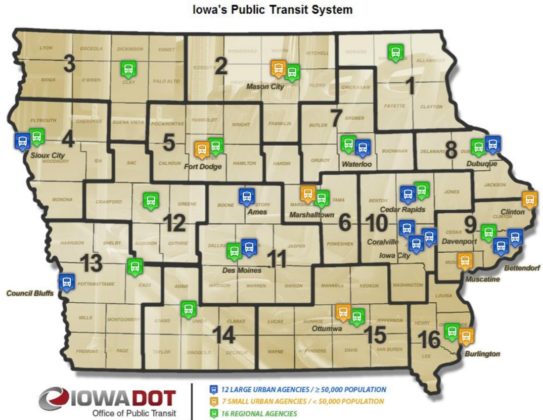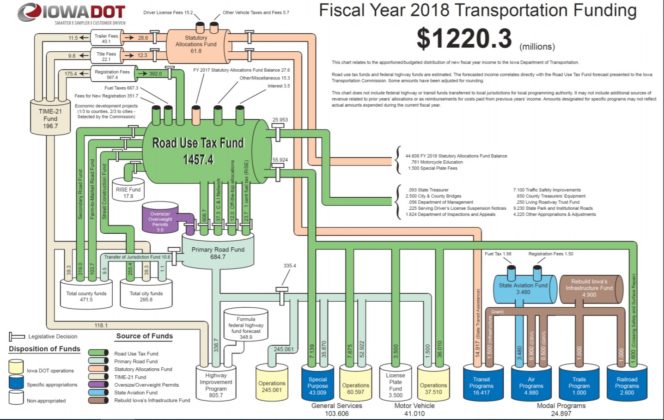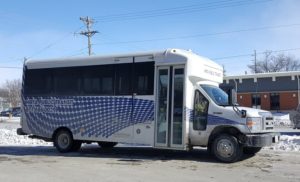 Dallas County public transportation arrangements in place for more than 40 years will be unsettled starting April 1, when the longtime contract between HomeCare Services Inc. of Dallas County and the Heart of Iowa Regional Transit Agency (HIRTA) comes to an end and HIRTA begins directly providing rides in their familiar blue and white vans and buses.
Dallas County public transportation arrangements in place for more than 40 years will be unsettled starting April 1, when the longtime contract between HomeCare Services Inc. of Dallas County and the Heart of Iowa Regional Transit Agency (HIRTA) comes to an end and HIRTA begins directly providing rides in their familiar blue and white vans and buses.
HIRTA buses give door-to-door rides primarily to the elderly and people with mental and physical disabilities in Dallas County and six other central Iowa counties. The transit agency’s seven-member board of directors — composed of one county supervisor from each county — voted in January to terminate its contracts effective July 1 with HomeCare Services Inc. of Dallas County and Madison County Elderly Services, the system’s last two transit subcontractors.
In response, the HomeCare Services Board of Directors chose to speed up the severance process, voting at its February meeting to give HIRTA a 30-day notice of its intention to end the contract effective March 31. Both HIRTA and HomeCare Services have issued statements assuring riders of seamless continuity during the transition in services.
“HomeCare and HIRTA intend to work together on a plan that supports minimal disruption in services during the transition period in March,” according to a March 1 letter from the HomeCare Services Board.
“HIRTA staff is working with HomeCare Services Inc. of Dallas County staff to make this a seamless transition as possible,” HIRTA said in a March 6 statement on its website. “We are excited to serve those who currently ride HIRTA and also hope to open the door to those who are new to the public transit experience.”
Under its soon-to-lapse contract with HIRTA, HomeCare Services operates 11 vehicles and employs eight drivers, who provide more than 2,300 rides each month to Dallas County residents, including 600 to 800 trips a month in Perry.
HomeCare Services Transportation Supervisor Marge Westphal said she hopes HIRTA can preserve the sense of a close-knit community that HomeCare has fostered over four decades in Dallas County.

“Some of these drivers have know these people their whole lives,” Westphal said. “They’re neighbors, or they went to school with their kids. We hope we can continue that for the residents of the county. Growth is good, but sometimes you lose something with that growth. We’re just fortunate to have such dedicated employees who work for our agency. They care about the residents of Dallas County. They enjoy that comraderie.”
Region-wide, some 60 HIRTA drivers operate about 92 buses, from 15 buses in Story County, the region’s most populous county, to six in Madison County, the least populace. When the HIRTA region formed in 1976 — one of 16 regional transit agencies in Iowa — it contracted with eight providers in the seven counties.
The move toward direct service by HIRTA started in Jasper County in 2007. With the termination of its contracts with Dallas and Madison counties, HIRTA will become the 14th regional system in Iowa to offer direct service throughout its region, leaving only one region serviced wholly by subcontractors and one region using a mix of direct and subcontracted services.
The change is motivated in part by dwindling state and federal funding for all social services, including mass transit, and that means tight budgets. HIRTA ran into budget difficulties in 2017 after former Iowa Gov. Terry E. Branstad privatized Iowa’s Medicaid program. The new managed care organizations (MCOs) contracting with the state stopped paying for some longtime transit services and reformed — “complicated,” according to HIRTA Executive Director Julia Castillo — booking procedures.
The resulting dip in ridership led to a $400,000 shortfall in HIRTA’s 2018 budget and forced upwards of $1 million in cuts to the agency’s 2019 budget. The agency also lost about $40,000 in funding this year from Aging Resources of Central Iowa, the Area Agency on Aging (AAA) that serves the same seven counties in central Iowa as HIRTA serves and doles out federal and state dollars for nutrition programs, which took a 21 percent across-the-board cut in January, and for supplemental services, such as transportation, which were cut 10 percent.

Castillo puts the responsibility for HIRTA’s financial woes squarely on “this whole Medicaid fiasco that’s been going on in our state. That took about 40 percent of our funding based on one change that they made,” she said. “We’ve been fighting through that. So there’s this financial situation, and now our federal dollars are all being held and not released, so it’s not a great time right now for transportation. Everything’s kind of all at one time right here.”
At the same time, HomeCare Services Inc. of Dallas County is struggling with its own funding challenges. Along with operating the county’s HIRTA buses, HomeCare Services provides in-home aid for the elderly and infirm, and it runs the senior nutrition programs across the county, Meals on Wheels and Congregate Meals. The agency also cooks some 2,700 meals for prisoners in the Dallas County Jail each month.
HomeCare’s cooking and cleaning services are also under mounting budgetary pressures.
The Dallas County Board of Health voted last year to withhold about $50,000 in Local Public Health Services Contract (LPHSC) funding from HomeCare Services’ in-home aid program, and in January they denied HomeCare’s request to restore the funding for fiscal year 2020. HomeCare Services used the funding to provide homemaking services for people not otherwise eligible for those services under another agency.
“We used to do some work with them on their homemaker’s services, but we haven’t done that for over a year now,” said newly appointed Dallas County Public Health Department Director Suzanne Hegarty. She said the LPHSC funds used to be earmarked for in-home aid, but changes in Chapter 80 of the Iowa Code now give local health departments much more flexibility with how the funds are spent, and many departments are focusing the funding on other services.
Hegarty said the Dallas County Public Health Department now administers its in-home aid services as an in-house program, cutting out the subcontractor much as HIRTA cut out the subcontractor on the transportation side.
HomeCare Services also felt the 21 percent cut in nutrition funding from Aging Resources of Central Iowa, and the soon-to-be-completed Dallas County Law Enforcement Center in Ortonville will include a kitchen suitable for preparing inmate meals.
But transportation services are on the front burner now, and the HIRTA Board was unanimous in its January vote to terminate the contracts with Dallas and Madison counties, except for HIRTA Board member and Dallas County Supervisor Kim Chapman, who opposed the resolution.
“There’s advantages to being part of the bigger group,” said HIRTA Treasurer and Boone County Supervisor Bill Zinnel. “Boone had gone through this transition last year. Our provider was having financial difficulties, and we ended up going directly through HIRTA, and it takes a little transition, but I think it’s been a positive for the community. The rides cost less. It costs the county less just to support it because the old provider just wasn’t as efficient.”
Direct provision of transit services will also mean lower insurance costs, Zinnel said, because insurers look askance at the subcontrator relationship. He said HIRTA-provided rides will also bring greater uniformity and better coordination of services across the region, a point also emphasized by Castillo.
“This is not a criticism of the contractors,” Castillo said. “When I’m out advertising, I’m like, ‘Okay, we operate in seven counties. In these five counties, this is what we do, but in these two counties, you have to call them directly, and their fares are different, and all of this stuff is just different.’ So it’s a little bit tricky, and people don’t understand that in the communites, especially agencies like public health or hospitals that work with people in all of our other counties. They’re like, ‘So why is it only $2 in Boone County to ride in town, but in this county it may be $5?’ The answer is because we contract with them. The consumers want what they want, and it just makes everything a little more difficult to coordinate things.”
Castillo said HIRTA will also be better positioned to introduce innovative services and expand the base of riders via marketing campaigns than the county-level contractors.
“Times have changed since 30 years ago,” she said. “People have changed. Their transit needs are changing and sometimes in the smaller communities, we haven’t changed much from 30 years ago in the contracted areas. We have an app now where people can schedule on their app on not have to wait on the phone. You’d be surprised how many people are using that. There are some things that we could implement that would bring transportation more into this century, where I think we would then target more people.”
The prospect of HomeCare Services’ losing the HIRTA contract calls the future of the entire agency into question, according to Adel City Council member Bob Ockerman, who attended the January HIRTA meeting and encouraged a continuation of the contract.
“This puts a local business and storefront on our square in jeopardy,” Ockerman said. “All three of their services are intertwined, and they really need all three of them to keep things going, it looks like to me.”
Westphal said the HomeCare Services Board is looking at options for reorganizing their overall operation, including seeking partnering agencies and restructuring operating and administrative costs.
“The board is assessing the options that are available to us,” said Westphal, “and I’m sure they’ll select the one that they feel is best for them so that they can continue providing all three services within the agency, so that we can continue to be a strong community provider of transportation, nutrition and in-home aid.”
In a Jan. 17 letter to the Dallas County Board of Supervisors, HomeCare Services Board Secretary Marilyn Warling requested $220,000 in funding from the county for fiscal year 2020, the same amount received in fiscal year 2019. The figure included the agency’s usual request of $185,000 plus an additional $35,000 to offset the Dallas County Board of Health’s “redirection” of the LPHSC funding.
“We continue to experience significant challenges related to competing priorities,” Warling told the supervisors. “HomeCare Services Inc. is poised to reposition the agency while continuing to meet the needs of our county’s elderly, disabled and economically disadvantaged citizens. The health and safety of a vast population of our county’s frail citizens is contingent upon our existence and ability to provide pertinent services. We are the only ‘safety net’ provider in Dallas County. Our current care delivery averages over 2,300 transportation rides, 220 direct aide hours and 2,400 senior nutrition meals each month. The demise of HomeCare Services Inc. would result in over 355 individuals being adversely affected: 325 clients and 30 part-time and full-time employees.”
The HomeCare Services Board repeated its commitment to delivering care in a Feb. 28 statement announcing its decision to terminate the contract with HIRTA.
“For more than 45 years, HomeCare Services Inc. has worked to develop Dallas County’s transportation program and provide transit service in Dallas County. The decision (to end the HIRTA contract) marks a significant change for the agency. However, the Home-Care Aide and Nutrition Programs — congregate meals and home-delivered meals — will continue to serve residents of Dallas County as they have in the past.”

HomeCare Services Home Aid Coordinator Deb Anderson, who directs the homemaking program defunded by the Dallas County Board of Health, said she was trying to take the funding fluctuations in stride.
“”We try to fill that gap and make the services afforable for everybody involved,” Anderson said. “That way, no one is left with barriers to service. It’s a juggling game sometimes, trying to make ends meet and pay bills like everybody else but yet get the quality service out there to everybody who needs it.”
Westphal also said she was trying to roll with the funding punches.
“It’s a challenging environment out there, for sure,” she said.
Beginning March 18, HIRTA riders wishing to schedule a trip needed on or after April 1 should call HIRTA at 1-877-686-0029 or email your request to erides@ridehirta.com.
